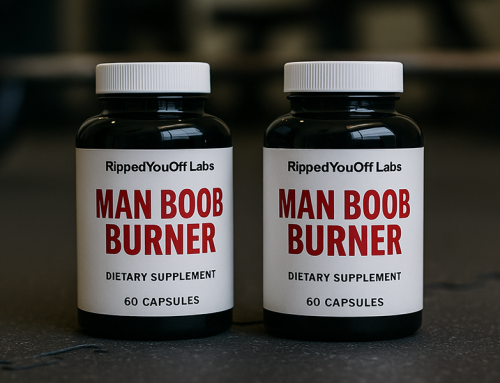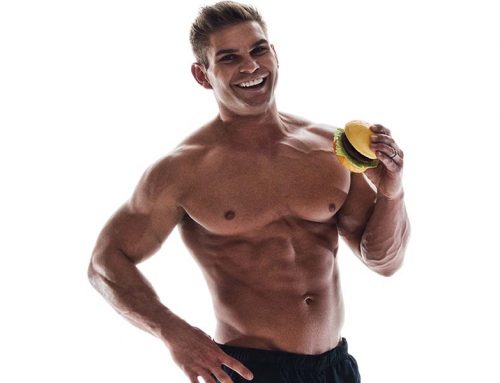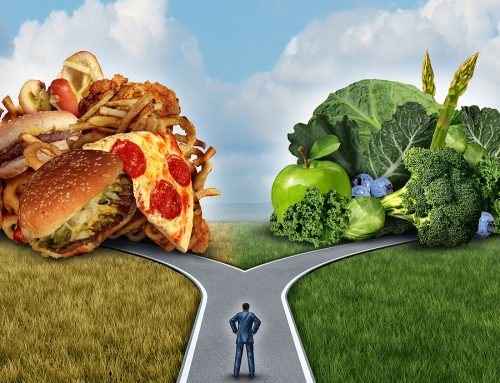It’s an amazing time to be alive. Today, there’s more health fitness and nutrition knowledge available at your fingertips than ever before, including more evidence-based (scientific) information. You’re on an evidence-based website right now. The problem in this new internet age is that mixed in with some of the best info we’ve ever had, is an equal if not larger amount of diet myths and misinformation circulated by quacks, cons, charlatans and snake-oil salesman.

I recently made a post on Instagram and Facebook about 10 things these diet quacks say. That got quite a few reactions (in both directions), so I followed up with another post listing 10 more (there’s a lot of BS to debunk out there!). Again, it was a popular post. This subject strikes a chord with people because in their quest for a healthy and lean body, nearly everyone has been misled or ripped off at some point and they don’t want to get robbed again.
Since social media posts have a short half-life, I thought it would be worthwhile to combine and capture all 20 of these diet lies and leave them in one place here on the blog for posterity.
1. Calories in, calories out (CICO) is wrong (“calories don’t matter”).
First, let me say this: telling people to eat less and exercise more may be fundamentally the right advice, but it’s not very helpful in a practical way. It’s like telling someone struggling with finances to spend less and earn more. That’s also the correct advice, but easier said than done without explaining specifically how to do it and uncovering and preparing for the many obstacles that stand in the way.
In addition, saying weight loss is “only a matter of calories in versus calories out” is oversimplifying an incredibly complex and dynamic energy balance equation. Different foods have different thermic effects and effects on satiety and subsequent appetite. Some foods are almost impossible to overeat. Some foods are almost impossible to stop eating. The body adapts and seeks homeostasis. Not to mention how hard it is to balance the calorie ledger because of our modern physical and social environment.
But at the end of the day, after all the complexities are acknowledged, and after all biological adaptations are accounted for, energy balance (calories in versus calories out) is always the bottom line. You need a calorie deficit to lose fat, period.
Engage in calorie denialism at your own peril
2. Keto is superior for fat loss.
The idea that carbs make you fat is a huge diet myth. Low carb diets, including low-carb, high-fat ketogenic diets can work for weight loss. There are countless studies confirming it. But if you look at the sum of all the evidence, you’ll see there is no difference in fat loss between low carb, high fat diets, low fat, high carb diets, or anywhere in between. If protein is adequate and matched for comparison, and if someone can stick to the diet, the results are similar regardless of the macros. The amount of fat or carbs matters little or not at all. It’s the calorie deficit that produces the fat loss. Keto is not superior.
Do Ketogenic Diets Work? Yes, But I Still Don’t Recommend Them (Here’s Why)
3. You must eat right for your blood type to lose fat and get healthy.
Another one of the biggest diet myths is the blood type diet. The food plan that’s described in the “Eat Right For Your Blood Type diet” might be healthy, and if it helps get you in a calorie deficit it might help you lose weight. However, the idea that different individuals need to eat a different diet based on blood type (for health or for fat loss) not only has zero evidence supporting it, there’s evidence falsifying it.
4. Detox (and cleanse) your body to lose fat.
Everything that falls under the umbrella of detoxification and cleansing is utter BS. All of it. Here’s an easy way to save time and money: Avoid every person and company who promotes this detox and cleansing nonsense. You have a liver and kidneys. Your body detoxes itself just fine.
5. Butter and MCT in your coffee burns body fat.
If you want to put butter or oil in your coffee because you think it tastes good (like it’s a dessert coffee), that’s one thing. Fine. But the idea that adding hundreds of calories of fat to a beverage will magically burn off more body fat must be one of the dumbest diet fads that ever came down the pike.
An Honest Look at Bulletproof Coffee
6. Sugar is poison.
Sugar is not a poison. It’s the dose that makes a poison. According to scientific evidence as well as the position stands of every major health organization in the world, it is not necessary to cut out sugar completely, and small amounts are not harmful. What’s important is to minimize added sugar and be especially on guard that sugar calories are not leading to a calorie surplus and subsequent weight gain, which increases type 2 diabetes risk.
How Much Sugar Is Too Much? Detailed Answers From Science, Plus Common Sense
7. This ancient method has been used for centuries.
This snake oil marketing ploy is called appeal to antiquity (or appeal to tradition). It’s a logical fallacy. The reverse is also true. Just because something is new doesn’t always mean it is better. Appeal to novelty is also a logical fallacy. There’s no such thing as a new fundamental. Watch out for this “ancient secret” claim, it’s a classic marketing angle.
8. Intermittent fasting diets are superior because they optimize your hormones, and you should fast longer to trigger autophagy for anti-aging and health benefits.
When fasting or time-restricted feeding works for fat loss, it works for the same reason every diet works – because it helps someone achieve a calorie deficit. Fasting does nothing special for fat loss except help some people eat less. There’s no hormone magic in fasting. And while reasonable intermittent fasting won’t necessarily cause muscle loss, it certainly won’t help muscle gains. Long fasts will cause muscle loss. Losing muscle is the opposite of health-promoting or anti-aging. (And by the way, if autophagy matters to anyone, studies show that it happens simply by being in a calorie deficit, it doesn’t require fasting).
9. This (natural and holistic) diet cures cancer.
As Carl Sagan said, “Extraordinary claims require extraordinary evidence.” People who make claims as outlandish as curing cancer who don’t provide evidence proportional to the claim are among the absolute worst kinds of quacks, cons and charlatans.
10. Take these natural supplements to burn fat.
The entire “fat burner” category of supplements is bogus. In the case of supplements that are potentially thermogenic, the effect is so small, it’s not even clinically significant. Spending money on “natural” over-the-counter fat burner supplements is like paying a stupidity tax.
Do Fat Burners Work? The Scientific Truth (Burn the Fat Guest Blog From Examine.Com)
11. Take these hormone balancing supplements to lose fat (and get healthy)
“Hormone balancing” is a marketing buzzword and little more. It’s a powerful one because manipulating hormones sounds a lot sexier than cutting calories. Almost every so-called hormone problem that is named in “hormone balancing” diets (or supplements) would almost certainly be resolved, or at least improved, with a healthy balanced diet, resistance training, cardio training/active lifestyle, optimal sleep, and stress management. Check off all five of those boxes first and then see how your hormones are. Still have any issues or concerns? Talk to a real doctor / endocrinologist, not a quack or social media “influencer” selling a supplement kit.
12. Take our 7-day metabolism reset.
Metabolism doesn’t “reset” as if there were some kind switch you could flip. It has been proposed that higher calorie, higher carb days aka “re-feeds” might stimulate metabolism-regulating hormones. It has also been speculated that a full week or two at maintenance calories will be even more effective at counter-acting or metabolic adaptation from calorie restriction. However, the most recent research suggests that brief periods of higher carbs and higher calories will only give a temporary boost and probably won’t improve fat loss. Specific diet protocols or supplements that claim to “reset” metabolism are BS.
It’s a myth that people are overweight because of a slow metabolism. In fact, heavier people have faster metabolisms than lighter people. If you restrict calories (deficit), your metabolism slows down slightly. Your metabolism doesn’t get “broken” or “damaged.” Your body simply adapts. The only way to return it to normal (“reset”) is to go back to maintenance calories. Stop worrying about your metabolism – a slight bit of metabolic adaptation is perfectly normal.
The Real Science Of Metabolic Adaptation: What It Is And What You Can Do About It
13. Eat these foods to boost your metabolism.
Websites, tabloids and diet books are filled with promises that certain foods or drinks can boost your metabolism. There is a shred of truth to this. Foods like hot peppers and beverages like green tea and coffee have been shown to have a mild thermogenic effect. The problem is, the effect is so small, it makes no significant difference in weight loss over time. In addition, with stimulants like caffeine, your body adapts, so even the tiny effect that’s there in the beginning disappears over time (if only drinking coffee got us leaner – I wish!)
The thermic effect of food is a real thing and protein does have a higher thermic effect than other macronutrients. This can be significant in some situations, such as when someone shifts from very low protein to high protein diet. It’s not incorrect to say a higher protein diet has a small metabolic advantage over a low protein diet. Beyond the small benefit you get from a proper protein intake, for all practical purposes, there’s no such thing as metabolism-boosting foods – it’s mostly a marketing gimmick.
14. Diet soda is worse than regular soda.
Diet soda is not worse than regular soda. No, it does not “trick” your body into thinking calories are coming and release insulin and increase your appetite. No. Just no. Research that considers cause and effect and not just association has debunked this idea. Granted, there is no nutritional value in diet soda, but there’s value to weight control. Evidence shows that switching from calorie-containing liquids to non-calorie containing liquids will help weight loss, not hurt it, if all else remains equal.
15. Cut out dairy products because they cause fat gain (and inflammation).
Dairy products do not cause inflammation and they do not cause weight gain. Studies show that dairy products are associated with either a neutral or a positive effect on body composition. (Also keep in mind that there are many different types of dairy products). Cut out dairy products if you are lactose intolerant and they give you GI distress, or if you just don’t like them. Otherwise, enjoy. Greek yogurt is an especially great choice due to its high protein content. Studies also show that yogurt reduces hunger and makes you feel fuller. And cheese is awesome.
16. Add coconut oil into your diet – it’s one of the heart-healthiest oils.
There’s no reason not to use coconut oil in moderation, like other oils, but based on the latest research, it’s certainly not considered a heart healthy oil that should be added to the diet in any large amounts. I use it only occasionally when it makes sense for certain recipes to enhance the flavor profile. Quacks treat coconut oil as if it were a superfood and recommend adding large amounts of it to the diet. In Paleo, Primal, Keto and other low-carb cookbooks, coconut oil is often the main oil used in the recipes, and in silly amounts that make me LOL.
What the latest science says about coconut oil, health and weight loss
17. High glycemic load carbs and insulin are the root cause of obesity.
Reducing carbs (especially added sugar) and reducing GI/GL may have value for patients with obesity, diabetes, or metabolic syndrome, especially those who are inactive. Low carb diets, including keto diets, are a valid alternative approach for weight loss, and potentially useful for individuals with certain health issues.
A problem that remains is how low carb advocates explain why low carb diets work. Most advocates of the ketogenic diet believe in and promote the carbohydrate insulin model (CIM) of obesity. This states that carbohydrates produce insulin and insulin promotes fat storage and or prevents fat loss. Therefore, LCHF and keto diets have resulted in a widespread fear of carbs (“carbophobia”), a belief that carbs are fattening and a belief that fat loss depends on hormone control not calorie control. These are all damaging diet myths.
The carbs-insulin model has never been scientifically validated. In fact, it has been recently falsified scientifically. (Look up the work of Kevin Hall at the NIH). Fat gain is caused by an energy surplus. This is the calories-in versus calories out (CICO) model. Calories matter. Carbohydrates are not inherently fattening (absent a calorie surplus) and insulin is not the cause of fat gain or obesity. Will these diet myths ever die?
Carbohydrates, Insulin, And Obesity (J Speakman And K Hall) Abstract, 2021
18. Fruit is fattening (because it’s loaded with fructose).
This idea that fruit is fattening is probably the dumbest idea ever proposed in the diet industry. Double facepalm. How does anyone even fall for diet myths like this one? Well, maybe they fell for the carbz and insulin are bad ideas first. Or maybe they believed all the fructose fear mongerers. Poor fruit was the collateral damage. The truth is, science says fruit is associated with better weight loss. Unfollow, then run as fast as you can, as far away as you can from any diet guru who clams fruit is fattening – they are either clueless or con artists, one of the other.
Does Fruit (Or Fructose) Make You Fat? This Is The Answer Based On Science (See 14 Studies)
19. If you want to lose fat, don’t eat after 6 pm.
It’s just another diet myth that eating at night makes you fat. If not eating after 6 p.m. helps you eat fewer calories for the day, then sure, that might help you lose fat. On the other hand, if not eating in the a.m. helps you eat less, then sure, that might help you lose fat too. However, what time of day you eat makes little to no difference in your fat loss if the calories remain equal. Stop stressing over meal timing, choose your own customized meal plan schedule and focus on hitting your calorie and macro targets for each day, consistently.
How to create a customized meal plan schedule
20. Hundreds of thousands use our program. That many can’t be wrong.
Hundreds of thousands of people can be wrong, and often are. Millions of people can be wrong. The reason is not just because they are followers – it’s not wrong to be a follower if you follow the right leaders. People end up in the wrong when they’re blind followers or they’re following all the other followers. If you follow the herd, you have to step in a lot of manure.
Let me leave you with some wisdom from the late great Earl Nightingale, who was the father of the personal development and success industry:
“Processionary caterpillars travel in long, undulating lines, one creature behind the other. The French entomologist Fabre once lead a group of these caterpillars onto the rim of a large flowerpot so that the leader of the procession found himself nose to tail with the last caterpillar in the procession, forming a circle without end or beginning.
Through sheer force of habit and, of course, instinct, the ring of caterpillars circled the flowerpot for seven days and seven nights, until they died from exhaustion and starvation. An ample supply of food was close at hand and plainly visible, but it was outside the range of the circle, so the caterpillars continued along the beaten path.
Habit patterns and ways of thinking become deeply established, and it seems easier and more comforting to follow them than to cope with change, even when that change may represent freedom, achievement, and success.
So many people miss the boat because it’s easier and more comforting to follow without questioning the qualifications of the people just ahead than to do some independent thinking and checking.
A hard thing for most people to fully understand is that people in such numbers can be so wrong, like the caterpillars going around and around the edge of the flowerpot, with life and food just a short distance away. If most people are living that way, it must be right, they think. But a little checking will reveal that throughout all recorded history, the majority of mankind has an unbroken record of being wrong about most things, especially important things.
For a time, we thought the earth was flat and later we thought the sun, stars, and planets traveled around the Earth. Both ideas are now considered ridiculous, but at the time they were believed and defended by the vast majority of followers. In the hindsight of history, we must have looked like those caterpillars blindly following the follower out of habit rather than stepping out of line to look for the truth.
It’s a good idea to step out of the line every once in a while and look around to see if the line is going where we want it to go. If it is not, it might be time for a new leader and a new direction.”
That’s all 20. To discuss, post in the comments below. And if you can think of any more that I missed, please feel free to post them below.
Tom Venuto,
Author of Burn the Fat Guide to Flexible Meal Planning

Tom Venuto is a natural bodybuilding and fat loss expert. He is also a recipe creator specializing in fat-burning, muscle-building cooking. Tom is a former competitive bodybuilder and today works as a full-time fitness coach, writer, blogger, and author. In his spare time, he is an avid outdoor enthusiast and backpacker. His book, Burn The Fat, Feed The Muscle is an international bestseller, first as an ebook and now as a hardcover and audiobook. The Body Fat Solution, Tom’s book about emotional eating and long-term weight maintenance, was an Oprah Magazine and Men’s Fitness Magazine pick. Tom is also the founder of Burn The Fat Inner Circle – a fitness support community with over 55,000 members worldwide since 2006. Click here to learn more about Burn the fat Inner Circle






You should add in there, “there’s no such thing as bad foods.” You might hurt some feelings with it though.
Hey Josh! yes indeed. I have already started writing part 3 (#21-30) and “there are good foods and bad foods” is already on the list
Please address all the gluten free bs. It seems like 50% of the country is worrying about gluten when celiac only affects ~3% of the population. Wheat products are good for you and help you build muscle after demanding workouts.
yup. that will be in the next part (#21 to 30) too. Right on.
Curious how you feel about the HAES movement. I understand about acceptance, and understand that there are factors to health other than your bodyfat %, but I just can’t wrap my head around it being ok to be 50,60,70+ lbs overfat. It just doesn’t feel good and your body doesn’t move like it should. Not to mention the evidence based risk factors of high blood pressure, diabetes, heart disease, etc.
Mark, thanks for your post. Im going to leave this for now: https://www.burnthefatinnercircle.com/public/Fat-But-Still-Fit.cfm. .. I wrote a very long detailed piece on HAES for our members… (https://www.burnthefatinnercircle.com/members/weight-neutral-and-health-at-any-size-HAES.cfm) maybe I’ll I copy it to over to the blog (public) to see.. I do know its a very important topic.
Apple cider vinegar is great for adding flavor to salad dressing, but I can’t understand why anyone thinks it’s a good idea to drink it for fat burning and weight loss!
Lol! ive said the same thing many times… ACV is half a good salad dressing… but thats about it. https://www.burnthefatblog.com/apple-cider-vinegar-weight-loss-scam/
“If you want to be wrong- then follow the masses”.
~ Socrates
470 – 399 BC
Great stuff, Tom! Straightforward, no-nonsense insight. I’ve been on the blood type diet for over 15 years, and intermittent fasting for the last 7 or 8. I’m a follower. Maybe I’m one of those caterpillars. I’m definitely way too lean and not at all convinced that I’ll change, but sticking to my guns when exposed to hard-hitting posts like this one won’t be easy. Thanks for the enlightenment
Intermittent fasting (time restricted feeding) has worked well for a lot of people. (so has keto). theres a ton of research on both and if someone has success with either, I wouldn’t discourage them from continuing. Especially if you find a protocol that helps control hunger and fits your lifestyle and personal preferences, that is good. In both cases the main problem remaining is that overzealous advocates (and marketers) often spin a story around them, claiming that they are superior to other diets (which is false based on the research), and or that they work in “magical” ways, (typically involving hormones and so on). Meanwhile when IF and keto work, its because they help people more easily get into a calorie deficit compared to other diet protocols. The blood type diet on the other hand has never had any evidence supporting it – no evidence that we need to choose what we eat based on blood type. However, as mentioned in the post, the foods and nutrition advice in that diet might be healthy or helpful with weight loss, but results from that diet dont have anything to do with blood type
On following the masses or “being sheep”, I feel like some context is required: on Earl Nightingale’s last line “It’s a good idea to step out of the line every once in a while and look around to see if the line is going where we want it to go. If it is not, it might be time for a new leader and a new direction.” The herd just might be going in the right direction, but indeed, it’s key to check. And sheep protect themselves from predators by remaining in a herd; it’s the one who is on their own – out of the safety of the herd – who is at risk of being taken by the wolf. Now, I also think of those who seem to step outside the line – like to innovators of our society – who might look like they are on their own, but they are usually trying to convince the herd to head in a better direction: convincing the rest with evidence to change. Not just stepping aside to look different and not be part of the herd. My quick thoughts.
Keen insights Mark. Context is always important. Earl always said throughout his writings and broadcasts that the herd is *almost* always wrong. In the context of popular diet culture, I think that holds true.
And you are helping to convince the herd to head in a better direction!
I’m going to agree to disagree with you on point 14. Though there are some articles out there that suggest positive effects from artificial sweeteners, there are many more that disagree with that stance. (The article you linked to is a counterpoint to one that suggests otherwise).. There are also studies out there that show correlations between artificial sweetener use by mothers and obese offspring. (I’m on my phone, so not so adept at linking, but you and I both know how to do a PubMed search on NNS..) My reading on the subject shows that for short-term use in health individuals, your stance is accurate, but the waters are much murkier when it comes to long-term usage or obese/diabetic individuals. There is often a correlation between connections with the food/beverage industry and positive findings..
My stance on the subject? There’s too much controversy for me to be comfortable condoning it.. For my diabetic/obese mother, I have been strongly advising her to steer clear of artificially sweetened items. She’s cut them way back, and her health has improved along with it. I will admit, her other lifestyle changes have also adapted, but I think that’s part of the point. Consuming large amounts of sweetened beverages (regardless of how they are sweetened) is not the best practice for making lasting lifestyle changes. As you reduce the artificial sweet and salty flavours, you really start to appreciate the variety of tastes and textures in your foods. And everything starts tasting too sweet, making it easier to control your consumption more naturally. (My background is an MSc in biochemistry and I work in the clinical trials industry).
You know, I usually dont even post about artificial sweeteners anymore because my experience is that 8 out 10 people have already made up their mind on the issue and even if they are evidence based, a debate could go back and forth with dueling abstracts without end and the opinion still wouldn’t change regardless of where the weight of that evidence tilted. I know there are some articles (peer reviewed studies) that suggest association of diet soda with weight gain, but all of them are just that – associations – correlations, there’s no cause and effect evidence. By the way, some of the bariatric physicians who have lately been suggesting on their social media accounts that diet soda is not worse than regular soda (for weight loss) also acknowledge that water, unsweetened tea, etc would be better but that diet soda could be helpful as a transitioning tool. think about the instant calorie savings for someone who had a hardcore soda habit who makes that switch. At any rate, I agree with you consuming a lot of sweet food could sharpen a sweet tooth and that getting used to only lightly sweetened food is a good thing. Also worth noting, there are a lot of sweeteners available today. Most complaints seem to be about aspartame, and secondarily maybe Sucralose. But there is also erythritol / stevia (monk fruit too). I researched everythritol in depth and can find zero cause for health concern and the only documented side effect is GI distress if you consume too much https://www.burnthefatblog.com/is-erythritol-safe-and-really-calorie-free/. cheers!
Great to read so much common sense. The problem with common sense is that it’s not really that common! Add in the commercial imperative and it disappears through the looking glass. Thank you Tom for all your work on our behalf.
youre welcome, and thank you for reading!
I purchased your book Burn the Fat Feed the Muscle about 15 years ago and even printed it all and put it in binders LOL. Since then I have learned so much and have been on quite the health journey. I am so happy to find your website and now your blog. I will be reading through it over the coming weeks. I thoroughly enjoyed this article as I have heard ALL of these claims/statements and more, like the whole gluten craze that is just beyond stupid. Anyhow, I love IF and it has been one of the only tools to truly help me and I feel great when I fast. Anyways, I just wanted to say HI :P
Hi Monika! thanks for posting. glad you found a style of eating that works for you.